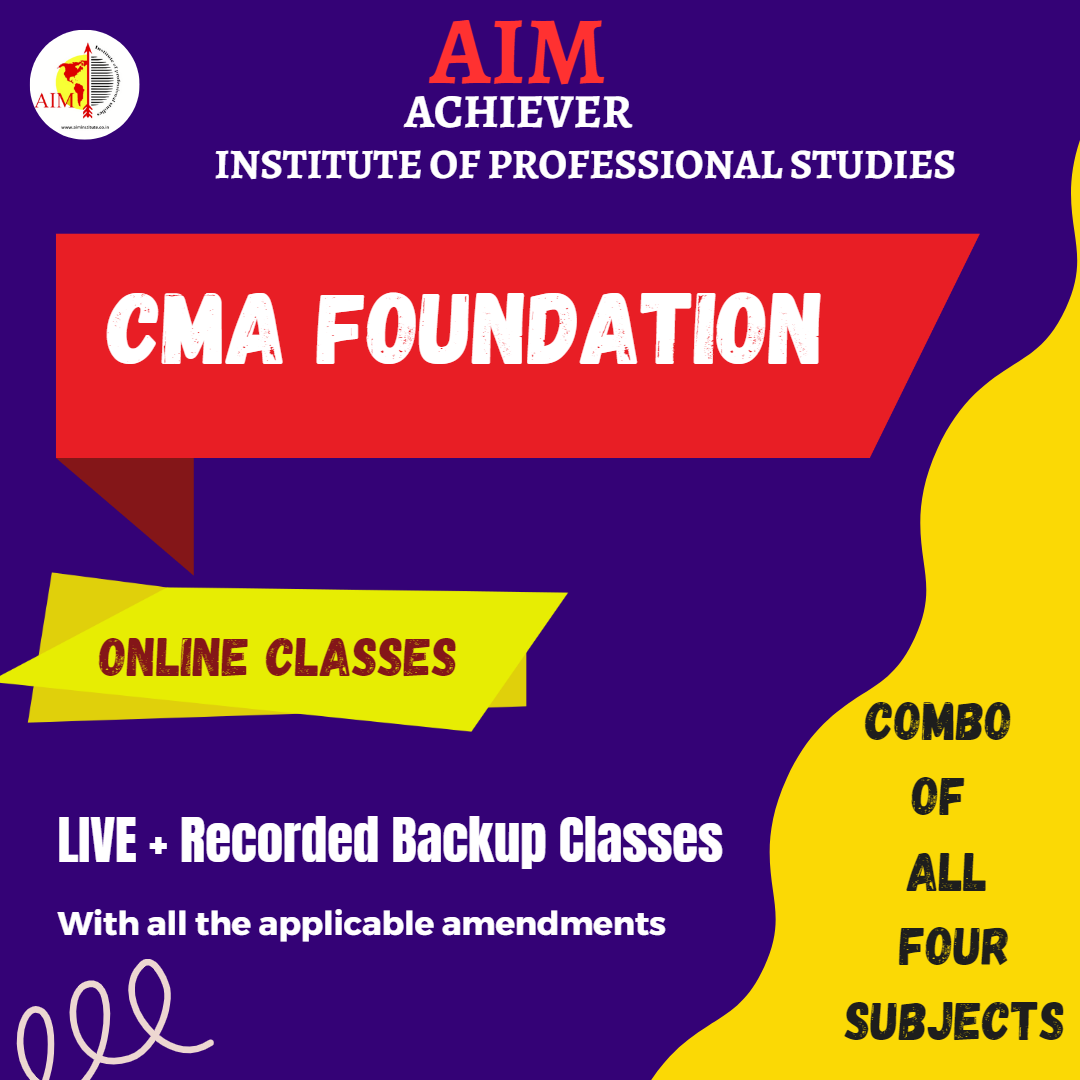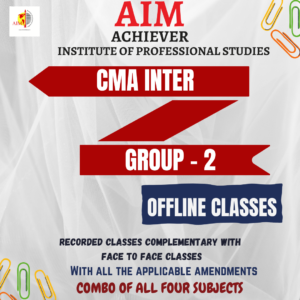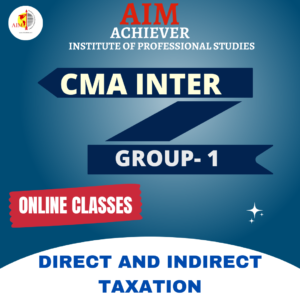Description
Buy CMA Foundation Online classes all subjects | Recorded classes | updated syllabus | 24×7 support. Expert Teachers. Join Our Online classes and Live Classes.
Subjects Cover
Paper-1 Fundamentals of Business Laws and Business Communication
Paper-2 Fundamentals of Financial and Cost Accounting
Paper-3 Fundamentals of Business Mathematics and Statistics
Paper-4 Fundamentals of Business Economics and Management
Course Info
CMA Foundation Law Full Course Online Lectures By CS Ruchi Dutt Kaushik . Soft Copy study materials will be provided with the same.
| Kit Contents |
|
| Batch Recording |
|
| Video Language |
|
| Mode |
- Mobile App
- Google Drive
- Pendrive
|
| Technical Support |
- Mobile: +91-7065300951
- Mail: info@aiminstitute.co.in
|
Course Content
Papers for CMA Foundation online classes
|
Paper Number
|
Subjects
|
|
Paper 1
|
Fundamentals of Economics and Management
|
|
Paper 2
|
Fundamentals of Accounting
|
|
Paper 3
|
Fundamentals of Laws and Ethics
|
|
Paper 4
|
Fundamentals of Business Mathematics & Statistics
|
Paper 1: Fundamentals of Economics and Management (FEM)
|
Section A: Fundamentals of Economics (50%)
|
|
1. Basic concepts of Economics
|
-
The Fundamentals of Economics
-
Utility, Wealth, Production
-
Theory of Demand (determinants of demand, the law of demand, the elasticity of demand-price, income and cross elasticity) and Supply (determinants, the law of supply and elasticity of supply)
-
Equilibrium
-
Theory of Production (factors, laws of production-law of variable proportion, laws of returns to scale)
-
Cost of Production (the concept of costs, short-run and long-run costs, average and
marginal costs, total, fixed and variable costs)
|
20%
|
|
2. Forms of Market
|
|
20%
|
|
3. Money and Banking
|
-
Definition of Money, Types, Features and Functions
-
Definition, functions, utility, principles of Banking
-
Commercial Banks, Central Bank
-
Measures of credit control and Money Market
|
10%
|
|
Section B: Fundamentals of Management (50%)
|
|
4. Management Process
|
-
Introduction, planning, organizing, staffing, leading control, communication, coordination
-
Concept of power, authority, a delegation of authority, responsibility, accountability
-
Leadership & Motivation
-
Decision-making – types of decisions, decision- making process.
|
50%
|
Paper 2: Fundamentals of Accounting (FoA)
|
Section A: Fundamentals of Financial Accounting (80%)
|
|
1. Accounting Fundamentals
|
-
Accounting Principles, Concepts and Conventions
-
Capital and Revenue transactions
-
The double-entry system, prime entry books, subsidiary books, cash Book etc
-
Journal, Ledger, Trial Balance
-
Depreciation
-
Rectification of Errors
-
Opening entries, Transfer entries, Adjustment entries, Closing entries
-
Bank Reconciliation Statements
|
35%
|
|
2. Accounting for Special Transactions
|
|
20%
|
|
3. Preparation of Final Accounts
|
-
Profit-making concern
-
Accounting treatment of bad debts, reserve for bad and doubtful debts, provision for discount on debtors, provision for discount on creditors.
-
Preparation of trading account, profit & loss account, balance sheet.
-
Not-for-Profit making concern
-
Preparation of Receipts and payment account
-
Preparation of Income and Expenditure Account
|
25%
|
|
Section B: Fundamentals of Cost Accounting (20%)
|
|
4. Fundamentals of Cost Accounting
|
Accounting & Management Accounting.
-
Classification of Costs
-
Format of Cost Sheet
|
20%
|
Paper 3: Fundamentals of Commercial Laws & Ethics
|
Section A: Fundamentals of Commercial Laws (70%)
|
|
1. Indian Contracts Act, 1872
|
-
Essential elements of a contract, offer and acceptance
-
Void and voidable agreements
-
Consideration, the legality of object and consideration
-
The capacity of Parties, free consent
-
Quasi-contracts, Contingent contracts
-
Performance of contracts
-
Discharge of contracts
-
Breach of Contract and its Remedies
|
40%
|
|
2. Sale of Goods Act, 1930
|
|
20%
|
|
3. Negotiable Instruments Act,1881
|
-
Negotiable Instruments–Characteristics of Negotiable Instruments
-
Definitions of Promissory Note, Bill of Exchange and Cheque
-
Difference between promissory Note, bill of exchange and cheque
-
Crossing – Meaning, Definition and Types of Crossing.
|
10%
|
|
Section B: Fundamentals of Ethics (30%)
|
|
4. Ethics and Business
|
|
30%
|
Paper 4-Fundamentals of Business Mathematics and Statistics
|
Section A: Fundamentals of Business Mathematics (40%)
|
|
1. Arithmetic
|
-
Ratios, Variations and Proportions
-
Simple and Compound Interest
-
Arithmetic Progression and Geometric Progression
|
|
|
2. Algebra
|
|
|
|
Section B: Fundamentals of Business Statistics (60%)
|
|
3. Statistical representation of Data
|
-
Diagrammatic representation of data
-
Frequency distribution
-
Graphical representation of frequency distribution
-
Polygon Curve, Ogive, Pie-chart
|
10%
|
|
4. Measures of Central Tendency and
Dispersion
|
-
Mean, Median, Mode, Mean Deviation
-
Range, Quartiles and Quartile Deviation
-
Standard Deviation
-
Coefficient of Variation
-
Karl Pearson and Bowley’s Coefficient of Skewness
|
30%
|
|
5. Correlation and Regression
|
-
Scatter diagram
-
Karl Pearson’s Coefficient of Correlation
-
Regression lines, Regression equations, Regression coefficients
|
10%
|
|
6. Probability
|
|
10%
|





Reviews
There are no reviews yet.